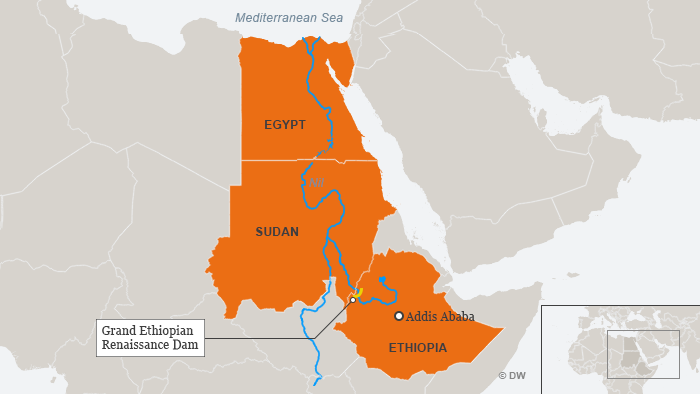Ethiopia’s Disinterest in Dam Negotiations Can Ignite War with Egypt

Another attempt to resolve the dispute between Egypt and Ethiopia over a large Chinese-funded hydroelectric dam built on the Nile River has failed. This has increased tensions over control of the most important water source in the region, especially for Egypt that has relied on the Nile for thousands of years.
Cairo sent a letter to the United Nations Security Council requesting it to intervene in the dispute over the Great Renaissance Dam of Ethiopia (GERD). A hasty filling of the dam in Ethiopia threatens food and agriculture in Egypt and Sudan, and for this reason Cairo wants the UN Security Council to lend a hand in tripartite negotiations.
In its letter, Egypt’s Ministry of Foreign Affairs activated Article 35 of the UN Charter, which allows member states to warn the international entity of any crisis that threatens peace and security. Egypt’s Foreign Ministry decided to appeal to the UN after tripartite negotiations stalled due to Ethiopia’s “non-cooperative behavior.” The GERD, that Ethiopia has been working on since 2011, is to provide electricity for not only the whole country, but also its neighbors. The main problem Egypt and Sudan have with the Ethiopian project is the timeline to fill up the $4.8 billion dam with water.
Source: InfoBrics
Leaders in the Ethiopian capital of Addis Ababa insist on continuing to fill the GERD unilaterally and without consideration how it will affect waterflows in Sudan and Egypt, according to Cairo. Ethiopia’s activities would be a violation of the Declaration of Principles that is supposed to prevent Addis Ababa from taking any action that would detriment the interests of Egypt and Sudan.
Egypt proposes that the dam should be filled gradually over a 10-year period, something that Ethiopia rejects as it wants to fill the dam in only three years. As a result of this rush, Egypt and Sudan may run out of 25 billion cubic meters of water a year that could lead to a severe drought and crop destruction.
Before Cairo appealed to the UN Security Council, Ethiopian Foreign Minister Gedu Andargachew warned on Friday that if his country were forced to “wait for others’ blessing” then “the dam may remain idle for years.” He added that “we want to make it clear that Ethiopia will not beg Egypt and Sudan to use its own water resource for its development.”
This raises the question on whether Cairo and Addis Ababa are on the brink of a war over water.
“We will never allow any country to starve us, if Ethiopia is prudent, we, the Egyptian people, will be the first to call for war,” Naguib Sawiris, an Egyptian billionaire with nearly 7 million followers on Twitter, wrote in a tweet. This comment comes as Egypt has consistently said for many years that it is willing to airstrike the dam if drought is imminent because the dam is not filled up over a 10-year period. Egypt is concerned that once the dam’s locks begin controlling the flow of the Nile, Ethiopia may not release water in times of drought because it needs it for itself. Ethiopia says once the dam is filled, it will not affect the water supply to other countries.
In 2015, the leaders of Egypt, Ethiopia and Sudan agreed to appoint a neutral consultant to assess the impact the dam would have on these countries. Ethiopia should have carried out this consultation before the construction of the GERD began. Egyptian officials believe this reluctance from Ethiopia was due to the country seeking to establish “hydro-hegemony” in the region. This suspicion is heightened because of the Gibe III Ethiopian dam on the Omo River that was built without prior cross-border consultation with Kenya. In 2018, the UN warned that Gibe III was taking water from Lake Turkana in Kenya and threatening national parks that are UNESCO World Heritage Sites.
The GERD, which will generate up to 15.7 gigawatts of electricity a year, represents a matter of national survival for Egypt, Sudan and Ethiopia. Egypt obtains 97% of its water from the Nile, while for Ethiopia the dam is vital because it would increase energy production by 150% at a time when more than half of its population does not have access to electricity.
Although the Nile is more than 2,480 kilometers long, its flow is low and it transports only 1.4% of the water that the Amazon is capable of, or one sixth of that of the Mississippi River in North America, and less than half of the Danube. Furthermore, its volume is expected to be further reduced by climate change, making it critical for Egypt and its 100 million people for their very survival. It is for this reason that Cairo will exhaust every diplomatic effort possible, but will likely take military action if Egypt suffers a drought as a result of the dam.
*
Note to readers: please click the share buttons above or below. Forward this article to your email lists. Crosspost on your blog site, internet forums. etc.
This article was originally published on InfoBrics.
Paul Antonopoulos is an independent geopolitical analyst.


